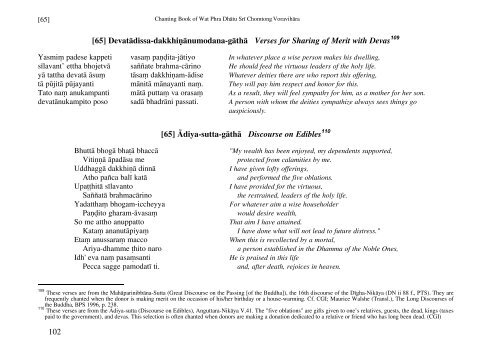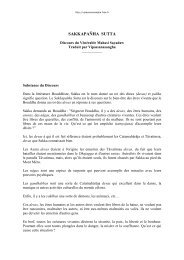Chomthong Chanting Book - Vipassanasangha - Free
Chomthong Chanting Book - Vipassanasangha - Free
Chomthong Chanting Book - Vipassanasangha - Free
Create successful ePaper yourself
Turn your PDF publications into a flip-book with our unique Google optimized e-Paper software.
[65] <strong>Chanting</strong> <strong>Book</strong> of Wat Phra Dhātu Srī Chomtong Voravihāra<br />
[ 65] Devatādissa-dakkhiõānumodana-gāthā Verses for Sharing of Merit with Devas 109<br />
Yasmiü padese kappeti vasaü paõóita-jātiyo<br />
sīlavant’ ettha bhojetvā saññate brahma-cārino<br />
yā tattha devatā āsuü tāsaü dakkhiõam-ādise<br />
tā pūjitā pūjayanti mānitā mānayanti naü.<br />
Tato naü anukampanti mātā puttaü va orasaü<br />
devatānukampito poso sadā bhadrāni passati.<br />
Bhuttā bhogā bhañā bhaccā<br />
Vitiõõā āpadāsu me<br />
Uddhaggā dakkhiõā dinnā<br />
Atho pañca balī katā<br />
Upaññhitā sīlavanto<br />
Saññatā brahmacārino<br />
Yadatthaü bhogam-iccheyya<br />
Paõóito gharam-āvasaü<br />
So me attho anuppatto<br />
Kataü ananutāpiyaü<br />
Etaü anussaraü macco<br />
Ariya-dhamme ñhito naro<br />
Idh' eva naü pasaüsanti<br />
Pecca sagge pamodatī ti.<br />
In whatever place a wise person makes his dwelling,<br />
He should feed the virtuous leaders of the holy life.<br />
Whatever deities there are who report this offering,<br />
They will pay him respect and honor for this.<br />
As a result, they will feel sympathy for him, as a mother for her son.<br />
A person with whom the deities sympathize always sees things go<br />
auspiciously.<br />
[ 65] Ādiya-sutta-gāthā Discourse on Edibles 110<br />
"My wealth has been enjoyed, my dependents supported,<br />
protected from calamities by me.<br />
I have given lofty offerings,<br />
and performed the five oblations.<br />
I have provided for the virtuous,<br />
the restrained, leaders of the holy life.<br />
For whatever aim a wise householder<br />
would desire wealth,<br />
That aim I have attained.<br />
I have done what will not lead to future distress."<br />
When this is recollected by a mortal,<br />
a person established in the Dhamma of the Noble Ones,<br />
He is praised in this life<br />
and, after death, rejoices in heaven.<br />
109 These verses are from the Mahāparinibbāna-Sutta (Great Discourse on the Passing [of the Buddha]), the 16th discourse of the Dīgha-Nikāya (DN ii 88 f., PTS). They are<br />
frequently chanted when the donor is making merit on the occasion of his/her birthday or a house-warming. Cf. CGI; Maurice Walshe (Transl.), The Long Discourses of<br />
the Buddha, BPS 1996, p. 238.<br />
110 These verses are from the Ādiya-sutta (Discourse on Edibles), Anguttara-Nikāya V.41. The "five oblations" are gifts given to one’s relatives, guests, the dead, kings (taxes<br />
paid to the government), and devas. This selection is often chanted when donors are making a donation dedicated to a relative or friend who has long been dead. (CGI)<br />
102



